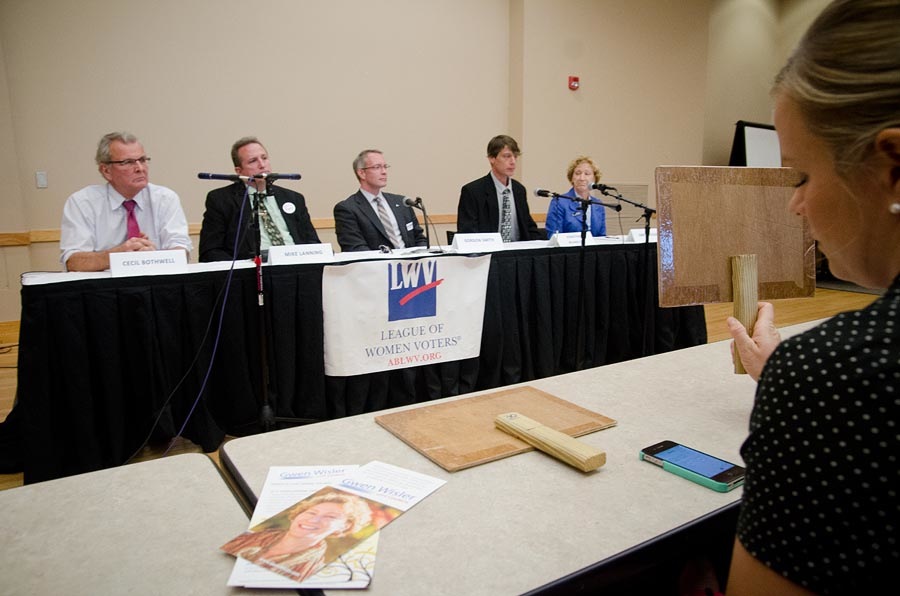The League of Women Voters’ time keeper holds up a placard ending a statement earlier tonight. From left, Council member Cecil Bothwell, Mike Lanning, Council member Gordon Smith, Jonathan Wainscott, and Gwen Wisler. Photo by Max Cooper.
Earlier this evening, locals got their first chance to see all five Asheville City Council candidates contend on general issues at a forum organized by the League of Women Voters. The crowd, skewing older, filled much of the room at UNCA Reuters Center. Xpress, along with several other organizations, was a co-sponsor.
For the first time in memory, there was no primary, due to the low number of candidates, so events for the Council candidates are getting a later start.
This year, there are three seats up for election. Incumbents Cecil Bothwell and Gordon Smith are both shooting for a second term. Former Coleman CEO Gwen Wisler, former Asheville Police Department officer Mike Lanning, and community activist Jonathan Wainscott are also running for a seat on Council.
Below, some major themes that emerged this evening, as WCQS News Director David Hurand aimed questions at the candidates.
Rumbling with Raleigh
On some issues, such as relations with the stae, the candidates were largely in agreement, though they varied in tone. All were in favor of continuing the lawsuit against the state legislature over the fate of the city’s water system, and even appealing if necessary. All answered “no” when asked if they’d settle the lawsuit, with Bothwell getting some cheers by saying “hell no.”
All the candidates opposed a draft bill by Rep. Tim Moffitt to force the city to shift to a district system. But Lanning and Wainscott said they both favored a district form, asserting it gives neighborhoods more representation, though they believed it should come locally, not from the state. The other candidates supported the current method of electing Council members at-large.
Wisler and Lanning both said they were open to more contact with the state legislature, with the former emphasizing working more closely with other cities and the latter noting he hoped future elections will “weed them out.” Bothwell sounded a more defiant tone, saying he believed any agreement was impossible, and that he was focused on “organizing to send them home.”
The economy
On economic issues, Smith touted companies like New Belgium coming to the area, highlighting a recent review he’s initiated of the city’s economic development policies, trying to make them more accessible to small and mid-sized business.
Wisler favored a similar approach and emphasized her business experience, a theme she’d revisit throughout the event, asserting that she “listens well…and know how to work on high-level issues.”
Bothwell, often a critic of economic incentives (though he supported New Belgium), said he favored concentrating on improving the overall quality of life, which he believes is a bigger draw than any tax credits Council hands out.
Lanning also talked about making the city attractive and improving its quality of life, but added that “you can’t eat a happiness sandwich,” drawing some chuckles from the audience.
Wainscott said the need for better-paying jobs was paramount, and mentioned his skepticism about the ability of the city’s affordable housing programs to affect the cost-of-living.
Crime and policing
In response to a yes or no questions about their confidence in current APD Chief William Anderson, Lanning and Wainscott again dissented, while the others affirmed their support for Anderson. Bothwell, who chairs Council’s Public Safety Committee, said that while the department needed more staff, they were managing to make things work by using overtime.
But Lanning, who’s made criticism of the current command of the APD the centerpiece of his campaign, said the department is “short-handed, they’re overworked,” something he said is a “real problem” that’s putting a strain on the rank-and-file.
Smith, repeating his campaign theme of “growing the middle class,” said that more economic opportunity, better affordable housing, and more access to health and fresh food would help reduce crime, and that should be part of the city’s focus. Wainscott shot back that “I’ve never heard of fresh food preventing crime” and said he sought the creation of an auxiliary police force. Wisler, noting her recent attendance at a forum about the future of the APD, observed that citizen opinion is divided about the department, and hoped the current planning process “will improve things.”
Management
City manager Gary Jackson fared a little better than Anderson. When asked, yes or no, if they had confidence in his administration, everyone answered “yes” except for Wainscott who demurred, as “I don’t consider that a yes or no question.” But issues of how the city is run came up several times throughout the discussion.
Smith and Bothwell both defended their accomplishment, especially on affordability and sustainability issues, with Smith saying he believed he’d “delivered” by putting more money in the affordable housing trust fund and building more transportation improvements. Bothwell highlighted the city’s expanded recycling program and energy efficiency measures.
Wainscott said he wanted to run the city more like a corporation, and believed enterprise fees were the key to improved finances (the others emphasized trying to get a hotel occupancy tax from the state) and “answering the legislature’s challenge. He returned several times to the idea of building a bottled water industry as part of the solution to Asheville’s economic issues.
Wisler noted she felt Council needed to do a better job of making the appointed school board accountable.
—-
Early voting begins Oct. 17. Election Day for Asheville City Council (and the mayor’s race), is Nov. 5.



Video of the 10.10.13 City Council Candidate forum at Reuter Center
http://youtu.be/hW145qqJdao